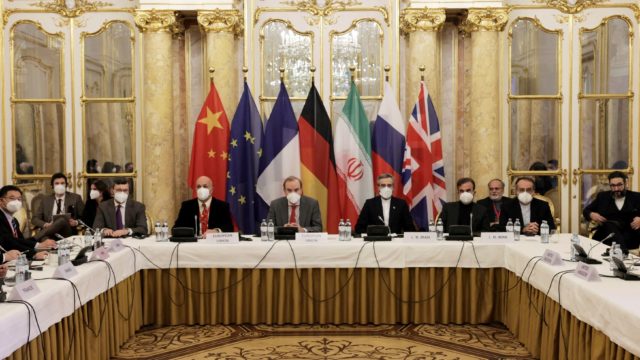
War cannot happen in a vacuum. The tentacles of the hideous Russian invasion of Ukraine are reaching outward to involve not only the two parties in the conflict, but other countries and other policies.
Let’s start with the revived Iran nuclear deal meetings that have convened in Vienna. The U.S. administration has made no secret of the fact that it covets a deal and has been willing to provide benefits to Iran up front, including waiving sanctions on Iran’s “civilian” nuclear program. But Russia has been a major player in the negotiations; until now, Washington and Moscow had been coordinating their positions. As a historical competitor of Iran’s, Russia was not particularly interested in having Tehran produce nuclear weapons, so it was willing to push for certain U.S. points.
On the other hand, Moscow is much more concerned about Sunni jihad than Shiite jihad. Russia’s Muslims are mostly Sunni and Putin’s vicious Chechen war was about stamping out Sunni jihad as much as anything else. (That would have been a warning about what sort of war Russian president Vladimir Putin was prepared to wage in Ukraine, had the West been paying attention.) And Russia’s criminal participation in the Syrian war was, among other things, about killing Sunni jihadists with the help of Iranian Shiite militias.
Aligning with Iran in Syria made sense from the Russian point of view, but aligning in part with the U.S. in Vienna did as well.
Until Putin invaded Ukraine. His interest in helping U.S. President Joe Biden get a win at any level disappeared. Furthermore, Putin is relying on Israel—the only country both Moscow and Kyiv accept as a conduit—as a negotiator with Ukraine. While Israel’s primary objective in that role surely is to end the horror of Russia’s conventional war, Prime Minister Naftali Bennett almost certainly raised the issues of Iran, nuclear weapons and Russia’s position in Vienna while he was at it. A hard Russian line in Vienna would help Israel.
Russia took that hard line. Now embargoed by much of the world, Putin & Co. added a proviso in Vienna that Russia wouldn’t agree to a deal unless the U.S. lifted energy sanctions on Russia stemming from the war—a move consistent with Moscow’s current interests. The U.S., naturally, refused this apparent ploy to end the Vienna talks. The talks are now on “pause,” postponing and possibly sinking a revived Iran deal.
Russian policy has left the Iranians even angrier with the U.S. than usual. They were assuming Biden would take a deal—any deal—and frankly, a lot of other people thought so as well. But even Biden couldn’t take this deal.
As if to prove that it has ways to make the U.S. pay, Iran launched rockets that hit the American consulate in Irbil, Iraq. Iran wants the U.S. to sign a deal, and at the same time it shells American assets. The White House said it reserves “the right to respond at a time and manner of our choosing, but we’ll wait for the attribution to be concluded first.” The IRGC—an internationally sanctioned Iranian terrorist entity—claimed credit for the attack on what it characterized as an outpost of “the fake Zionist regime.” No response from Washington.
Iran’s goal—by its own admission—is to destroy Israel, and it is taking advantage of the world’s preoccupation with Ukraine to increase its military activity in southern Syria near Israel’s border. The mullahs continue to ship weapons to both Syria and Lebanon—violating one of Israel’s red lines. Jerusalem continues to strike relevant targets, this week killing two IRGC officers involved in the smuggling of precision missiles through the Damascus airport.
Israel’s ability to defend its northern border from Iran and Hezbollah depends in some measure on Russia’s agreement to Israel’s operations and ongoing deconfliction. A change in Russia’s attitude toward Israel, related to the Ukraine war or anything else, could change Israel’s operational plans. Russia’s position is not a merely diplomatic one. With an airbase and a naval base in Syria, Moscow could try to enforce a change in policy—although admittedly, it doesn’t look likely right now.
But still, it is another tentacle.
It is unclear that Putin thought he would find himself in this position when he sent his troops and tanks into Ukraine. He more likely envisioned a cakewalk to Kyiv. But here he is, and other parties—friend, foe or somewhere in between—are being left to untangle the morass.





